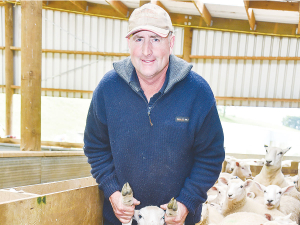Breeder credits late uncle for hair sheep success
Southland breeder Tim Gow attributes the success of his Shire breed of hair sheep to the expert guidance of his uncle, the late Dr Scott Dolling, who was a prominent Australian animal geneticist.
 Waimate farmer Tim Mehrtens says he has been pleasantly surprised at the Wiltshire's mothering ability and pre-weaning growth rates.
Waimate farmer Tim Mehrtens says he has been pleasantly surprised at the Wiltshire's mothering ability and pre-weaning growth rates.
Continuing poor returns for crossbred wool coupled with the emergence of triple drench resistance is driving an increasing number of sheep farmers to consider making the shift to low-input, no-shear Wiltshires.
Aside from shearing, the costs of crutching, dagging and flystrike are all eliminated with these shedding sheep. Meanwhile, Wiltshires are said to be more resistant and resilient to internal parasites than their wooly counterparts.
Will Pears, stud manager at North Canterbury's Mt Cass Wiltshire stud, says last year's inaugural sale exceeded all expectations in terms of price and interest. He is expecting the same at this year's sale on January 19.
Pears says last year more than 100 buyers from around the country competed strongly for both rams and ewes and feedback from purchasers has been overwhelmingly positive.
One of those buyers was Waimate farmer Tim Mehrtens. He admits it took a leap of faith in buying Wiltshire ewe lambs and rams at the Mt Cass's sale but was rewarded with a good lambing percentage and very good pre-weaning growth rates.
Mehrtens, who farms 215ha of rolling hill country, says the shift to Wiltshire genetics was driven by frustration with poor returns for wool. While he has been buying very good composite ewe lambs, in 2020 the difference between shearing costs and the wool cheque left him $3,500 out of pocket.
The first crop of pure Wiltshire and Wiltshire cross lambs, born last spring, exceeded expectations. Mehrtens says he was pleasantly surprised at the pre-weaning growth rates and their mothering ability.
Forced to wean early due to limited processing space, he says 220 twin male lambs killed out at 17.5 kgCW and a line of Wiltshire cross lambs averaged 17.7 kgCW.
Mehrtens has also noticed that a lot of the first cross lambs have started to shed.
"I'm stoked with the results," he says.
Could a breakthrough in fermentation create a new multi-million-dollar export market for shiitake mushroom extracts into China?
Meadow Fresh has created the world's first fantasy sports league powered by real cows.
This year, 'Foodie February' sees potatoes take the spotlight as one of New Zealand's most powerful and versatile food heroes.
A multi-cultural team is helping to establish one of New Zealand's largest plantings of premium eating grapes - while learning each other's languages and cultures along the way.
The World Wide Sires National All Day Breeds Best Youth Camp Best All Rounder plaudit has become family affair, with 2026 Paramount Cup winner Holly Williams following in her sister Zara's footsteps.
DairyNZ is giving New Zealand farmers a unique opportunity to gain hands-on governance and leadership experience within the dairy sector.

OPINION: Meanwhile, red blooded Northland politician Matua Shane Jones has provided one of the most telling quotes of the year…
OPINION: This old mutt has been around for a few years now and it seems these ‘once in 100-year’ weather…